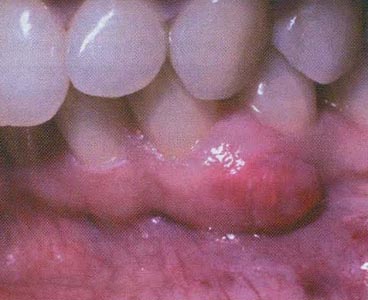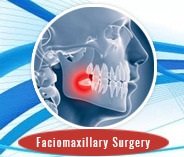A tumour is a growth caused by an overproduction of cells. A cyst is similar to a tumour, except that it is filled with fluid. Both tumours and cysts can form in the bone of the maxillofacial region, most frequently in the lower jaw bone (jaw tumours).
Benign cysts and tumours of the jaw bone are most often odontogenic, meaning that they originate from tissue related to the teeth. The most frequent kind of odontogenic growth develops near impacted teeth and is called a dentigerous cyst or tumour. It occurs when the follicle of an impacted tooth continues to grow, although the tooth is unable to erupt. This growth can cause the formation of a cyst or tumour that can damage surrounding teeth and bone.

Tumours are frequently benign, but can also be malignant (cancerous). Malignant bone tumours in jaw are either primary, meaning that the cancer originated there, or secondary, meaning that the cancer has metastasized, or spread to the bone of the jaw, from another area of the body. Primary bone cancer in the maxillofacial area is very rare. Malignant tumours in this region are more likely to have metastasized from elsewhere in the body.
Symptoms
Bone cysts and tumours very often do not have any symptoms. They are usually discovered during a routine x-ray, when a bone fracture occurs, or if they swell to a very large size. In some cases, however, they can cause bone pain.
Jaw Cyst Surgery Procedure
Surgery is performed for jaw cyst removal under local or general anaesthesia. In some cases, benign tumours and cysts can be left untreated. However, they usually need to be closely monitored by your doctor. Cells within odontogenic cysts and tumours can occasionally become malignant. But even benign cysts and tumours can also weaken or cause damage to the surrounding bone and tissue if they continue to grow.
Benign cysts and tumours of the bone generally need to be surgically removed. Depending on the nature of the cyst or tumour, a small or a large area of bone may need to be removed. In some cases, bone reconstruction of the area may be necessary. The area of the removed cyst or tumour will be monitored to make sure that it does not recur. Treatment of malignant tumours depends on the type and stage of malignancy.
As a result of the jaw operation, you may experience swelling of the cheek and lips, difficulties swallowing and opening your mouth, and a rise in temperature (up to 39//C). The symptoms will usually cease within 3 to 4 days. After one week the sutures can be removed, and the wound heals completely after about 8 to 10 days. Depending on the size of the cyst, it may take several weeks or months until the bone cavity is completely filled with bone material again.
Possible Complications
As with all other surgeries, post-operational bleeding and healing difficulties may occur. To minimize risks, you must carefully complete the case history form so that we can clarify in advance all questions regarding general diseases, allergies, complications after previous surgeries, bleeding behaviour, and medication.
Despite meticulous surgical techniques, nerves and blood vessels around the cyst may be damaged. Root canal treatment or, in the worst case, extraction of the affected teeth may be required.
During the removal of large cysts, there is a risk of damage to the mandibular nerve which may have been displaced due to the growth of the cyst. This results in a generally temporary, rarely lasting sensation of numbness in the affected half of the lower lip. However, the lower lip can still be moved normally. Very rarely, an extremely enlarged lower jaw cyst can cause a fracture of the mandible, which then requires proper treatment.
Behaviour after Surgery
You will be given instructions (pre- and post-operational behaviour) about what you should do before, on, and after the day of your operation. After oral surgery, difficulties in opening your mouth and swallowing are normal and should not worry you. In the case of sustained postoperative bleeding, severe swelling and pain, high fever or general health problems in conjunction with the surgery, you should notify us or your dental specialist immediately.















